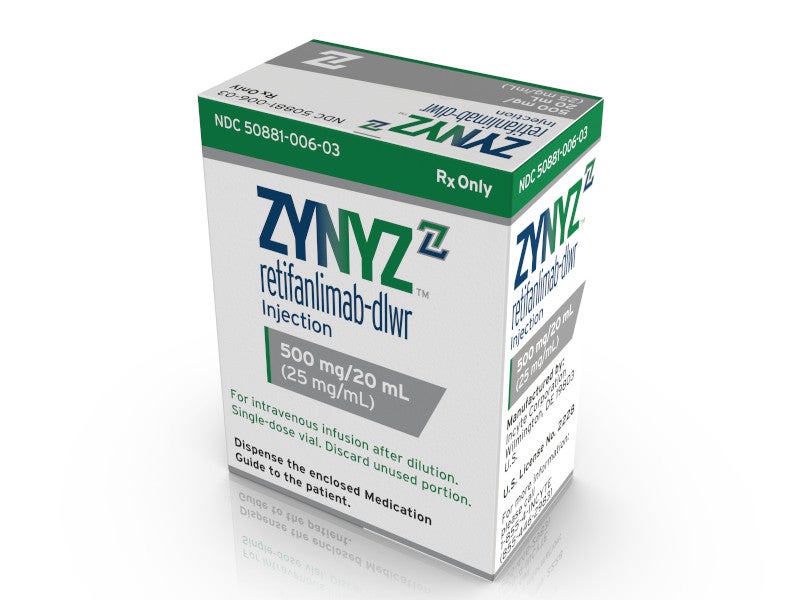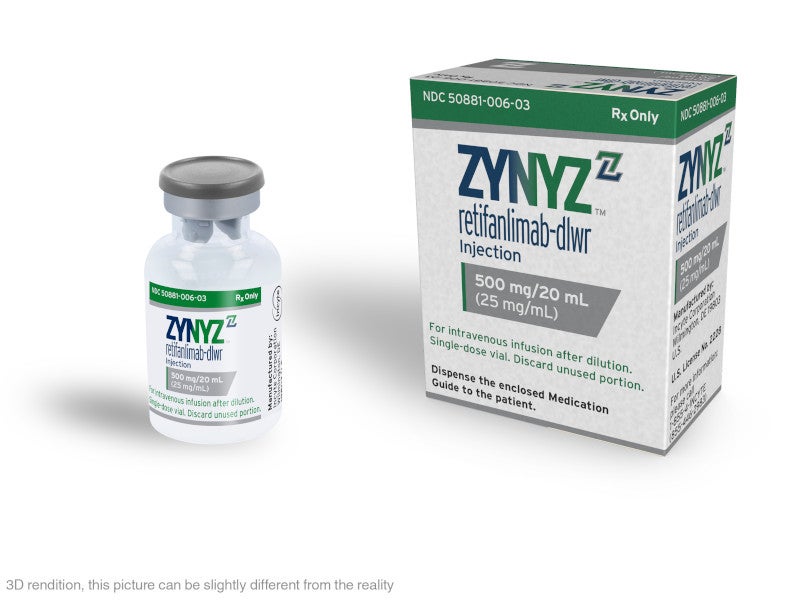Zynyz (retifanlimab-dlwr) is an anti-programmed death receptor-1 (PD-1) monoclonal antibody indicated for the treatment of metastatic or recurrent locally advanced Merkel cell carcinoma (MCC) in adults.
Previously known as MGA012, Zynyz was part of the pipeline of MacroGenics, a biotechnology company based in the US, and was studied as either a monotherapy or in combination with other agents across multiple studies.
In October 2017, MacroGenics granted the global rights to retifanlimab to the American biopharmaceutical company Incyte. As part of the agreement, Incyte holds exclusive worldwide rights to develop and commercialise the drug in all indications, while MacroGenics retains the right to develop its pipeline assets in combination with retifanlimab and commercialise the asset, if any such potential combinations are approved.
Zynyz is available in a single-dose vial containing a clear to slightly opalescent/colourless to pale-yellow solution of 500mg/20ml dosage strength for intravenous administration.
Regulatory approval for Zynyz
The US Food and Drug Administration (FDA) approved Zynyz under accelerated approval for the condition based on tumour response rate and duration of response in March 2023.
Furthermore, the drug holds orphan drug designation by the FDA for the treatment of anal cancer.
Merkel cell carcinoma causes and symptoms
Merkel cell carcinoma (MCC) is a rare and aggressive skin cancer characterised by a painless, reddish or purple skin nodule (a tumour) on the face, head, neck, or arms in skin exposed to sunlight.
It originates in Merkel cells, which are located at the base of the epidermis, the outermost layer of the skin.
A few factors generally associated with the development of MCC include being aged over 65, having fair skin, a history of considerable sun exposure, long-term immune suppression, and the Merkel cell polyomavirus.
MCC affects less than one in every 100,000 people in the US, but its rate is rapidly increasing, particularly among those aged above 65.
Zynyz’s mechanism of action
Retifanlimab-dlwr is a humanised monoclonal antibody that binds to the PD-1 receptor expressed on T-cells. It inhibits the interaction of the PD-1 receptor with two PD-1 ligands, PD-L1 and PD-L2, and enhances anti-tumour immune response.
The binding of the PD-1 receptor with PD-1 ligands is responsible for T-cell proliferation and cytokine production in cancer cells, which reduces anti-tumour immune responses.
Upregulation of PD-1 ligands in some tumours and the PD-1/PD-L1 pathway may contribute to the inhibition of active T-cell immune surveillance of tumours.
Clinical trials on Zynyz
The FDA’s approval for Zynyz was based on the positive outcomes of the POD1UM-201 clinical trial, a Phase II, open-label, multiregional, single-arm trial where 105 patients with metastatic or recurrent locally advanced MCC were enrolled.
Patients received Zynyz 500mg intravenously every four weeks as a single agent until disease progression or unacceptable toxicity, for a period of up to 24 months.
The major efficacy outcomes of the trial were objective response rate (ORR) and duration of response (DOR). The tumour response assessments were performed every eight weeks for the first year of therapy and 12 weeks thereafter.
Among the 65 chemotherapy-naive patients who received Zynyz monotherapy, the ORR was 52%. Complete response was achieved in 18% of patients, while 34% of patients achieved partial response.
The duration of response ranged from 1.1 to more than 24.9 months and 76% of patients experienced a DOR of six months or longer, among the responding patients.
The most common adverse reactions observed in patients receiving Zynyz were fatigue, musculoskeletal pain, pruritus, diarrhoea, rash, pyrexia, and nausea.





